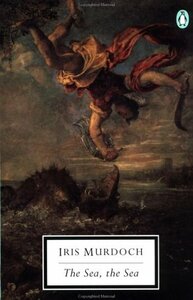Take a photo of a barcode or cover
Jealousy is perhaps the most involuntary of all strong emotions. It steals consciousness, it lies deeper than thought. It is always there, like a blackness in the eye, it discolours the world.
The Sea, The Sea is my second Murdoch and I definitely understand the hype. It's far from a flawless book, but she's a remarkable stylist, a master of unreliable narration, and creates a cast of characters who are hideous, hilarious and very memorable. Shruff End, the sea itself and the absurd machinations of Charles and his entourage (there's really no other name for them) are so engaging. In turn, they shocked, revolted, touched, and amused me, to the point of laughing out loud, while reading this book. Murdoch's greatest strength as a novelist is her characterisation which is so vivid. Her characters are monstrous, pantomime in their villainy, but human enough to be plausible and, at times, deeply sympathetic. I'm not forgetting gaunt, pale Charles Arrowby, "the rapacious magician", or Rosina living her permanent witches' sabbath anytime soon.
Themes aside, Iris Murdoch reminds me a lot of Dostoevsky as she's a novelist with an incredibly coherent philosophy and has the capacity to create characters who are forces of nature within the small world of her texts. She's a master psychologist who writes about human relationships in such a subtle emotional register. She understands what brings people together, and what tears them apart and is able to write about love, envy, resentment, and anger with an emotional force few novelists can match.
Obviously, this book is primarily about Charles' petty jealousies, immense self-conceit, and deceptiveness which he masks behind urbanity and boorish pretension. He's a tinpot dictator, a petty noble drunk on power. But it's also a book about disillusion. This is a book about illusions, about the crystal castles we erect in our mind, the fictions about the past we cling to, the roles we assign other people within our own personal narrative. Murdoch provides us with a Shakespearean warning about the futility of state-managing and directing the play of our life. Become the green-eyed monster sipping on nectar in the garden of memory at your peril because the storms you create will soon suck you into their vortex.
However life, unlike art, has an irritating way of bumping and limping on, undoing conversions, casting doubt on solutions, and generally illustrating the impossibility of living happily or virtuously ever after.
reflective
slow-paced
Plot or Character Driven:
A mix
Strong character development:
Yes
Loveable characters:
Complicated
Diverse cast of characters:
No
Flaws of characters a main focus:
Yes
adventurous
emotional
funny
reflective
slow-paced
Plot or Character Driven:
Plot
Strong character development:
Yes
Loveable characters:
Yes
Diverse cast of characters:
No
Flaws of characters a main focus:
Complicated
This a brilliant book which is in some ways utterly terrible.
Quick synopsis: arrogant theatre director Charles Arrowby retires to a run-down rural house overlooking the sea, where he unexpectedly encounters Hartley, a woman who he views as his first and only love. She is, however, now married. Also there is a mystical sea-serpent and a box-demon.
I was reminded while reading The Sea, The Sea of Nabokov's argument against Dostoyevsky (no, shut up, I was). Dostoyevsky dealt with important-seeming themes, but was not a great writer, or so sayeth Nabokov, because his inept plotting relied on a series of implausible coincidences to provide momentum. The Sea, The Sea (great title!) is chronically guilty of this flaw; the plot is utterly ridiculous and does not stand up to a moment's scrutiny; it is driven forward by impossible chance encounters and the ludicrously unlikely behaviour of secondary characters.
And yet somehow, despite this, I wound up viewing it as a great book. I think the chief reason for this is the subtlety of Murdoch's understanding of human psychology, which is unmatched by any other writer I've read. Arrowby's thoughts - the way he deludes himself, the way he uses others and justifies this, the way he structures his understanding of his life around his childhood rejection by Hartley, the comforting fictions he relies on - are meticulously and wonderfully captured. The reasons for, and impact of, controlling behaviour - both by Arrowby and by Hartley's husband - are explored with great insight.
I also think - and this seems to be a more controversial point, as a lot of people don't get on with her writing at all - that Murdoch writes some very good prose, both in terms of wonderfully capturing a particular atmosphere conjured up by, say, the way the light shines on sea-side rocks, and in terms of carrying off some very funny comic moments. It's certainly fair to say that her characters often don't speak like real people would speak, but I think it's harsh to criticise her for this - as some people do - when the overwrought speeches intentionally add to an atmosphere of mad melodrama.
In some ways, I suppose, this book is the inverse of The Unicorn, another Murdoch book set in a crumbling house on a remote shoreline. The Unicorn is a terrible book with moments of brilliance; The Sea, The Sea shows Murdoch as a much more mature writer, albeit one who is still unafraid of embracing extremely weird elements.
Quick synopsis: arrogant theatre director Charles Arrowby retires to a run-down rural house overlooking the sea, where he unexpectedly encounters Hartley, a woman who he views as his first and only love. She is, however, now married. Also there is a mystical sea-serpent and a box-demon.
I was reminded while reading The Sea, The Sea of Nabokov's argument against Dostoyevsky (no, shut up, I was). Dostoyevsky dealt with important-seeming themes, but was not a great writer, or so sayeth Nabokov, because his inept plotting relied on a series of implausible coincidences to provide momentum. The Sea, The Sea (great title!) is chronically guilty of this flaw; the plot is utterly ridiculous and does not stand up to a moment's scrutiny; it is driven forward by impossible chance encounters and the ludicrously unlikely behaviour of secondary characters.
And yet somehow, despite this, I wound up viewing it as a great book. I think the chief reason for this is the subtlety of Murdoch's understanding of human psychology, which is unmatched by any other writer I've read. Arrowby's thoughts - the way he deludes himself, the way he uses others and justifies this, the way he structures his understanding of his life around his childhood rejection by Hartley, the comforting fictions he relies on - are meticulously and wonderfully captured. The reasons for, and impact of, controlling behaviour - both by Arrowby and by Hartley's husband - are explored with great insight.
I also think - and this seems to be a more controversial point, as a lot of people don't get on with her writing at all - that Murdoch writes some very good prose, both in terms of wonderfully capturing a particular atmosphere conjured up by, say, the way the light shines on sea-side rocks, and in terms of carrying off some very funny comic moments. It's certainly fair to say that her characters often don't speak like real people would speak, but I think it's harsh to criticise her for this - as some people do - when the overwrought speeches intentionally add to an atmosphere of mad melodrama.
In some ways, I suppose, this book is the inverse of The Unicorn, another Murdoch book set in a crumbling house on a remote shoreline. The Unicorn is a terrible book with moments of brilliance; The Sea, The Sea shows Murdoch as a much more mature writer, albeit one who is still unafraid of embracing extremely weird elements.
Twisted, sick, sad, heartbreaking, wonderful, wonderful, wonderful.
Refreshing and nostalgic at the same time. With a brilliantly complex protagonist. It sits across multiple genres - comedy, tragedy, even thriller. An enjoyable story to get lost in.
One of the most preposterous story lines I have ever read.How this won a Booker is beyond me.
adventurous
dark
mysterious
tense
slow-paced
Plot or Character Driven:
A mix
Strong character development:
No
Loveable characters:
No
Diverse cast of characters:
No
Flaws of characters a main focus:
Yes
If this were about 50% shorter it might have been an okay read. But it’s so repetitive and tedious. The plot was not compelling, even if it attempted to be shocking. There wasn’t a single particularly likeable character. And in the end I wonder why Murdoch wrote 450+ pages about a horrible, unlikeable misogynist.
dark
emotional
funny
mysterious
tense
medium-paced
Plot or Character Driven:
A mix
Strong character development:
Yes
Loveable characters:
Complicated
Diverse cast of characters:
No
Flaws of characters a main focus:
Yes
I did not at first feel like writing about this book. From the start, I found the protagonist laughable at best and really - quite despicable. Dull, self-aggrandizing, quite petty. For any genuine praise he managed to give to any of his "friends" in describing them, he would undoubtedly follow it up with many more back-handed compliments and many times outright insults. He seemed obsessed with youth and appearances. I dreaded spending 500 pages in his world.
Two things I found intriguing which had me continue: for one, the introduction did a lot to give away the plot, promising a love triangle and a dramatic turn of events (strange thing for an introduction to do; though, in retrospect, it did not really spoil the book at all); on the other hand - I was quite curious about the format: the voice seemed distinct recorded in the form of a journal-trying--to-be-a-memoir-trying-to-be-a-novel, it was a genuinely interesting way to do a character study I haven't quite seem before. First person - yes. Further made interesting by a constant feeling of the story being recounted backwards in small chunks, rather than flowing forward or backwards, like a series of tiniest flashbacks. The introduction also did much to promise me a Jungian psychology take (which lies in parallel with my current reading of some psychology materials), so I pushed on.
The book caught me almost by surprise as half-way through I found I actually was invested in the plot and the characters.
There is a good amount of mysticism, mostly relayed through James' character, but there's generally an Erie atmosphere.
I'll also add that the story works best in my head if you interpret it as a dramatic retelling (seeing how unreliable our dear protagonist can be) or possibly altogether fictitious - with various parts of Charles' life coming to him as ghosts, embodying different parts of his quite exciting life.
This book also came into my life at the right time. Then again, it's never the wrong time to reflect of possessive love, jealousy, vanity and obsession with youth.
Two things I found intriguing which had me continue: for one, the introduction did a lot to give away the plot, promising a love triangle and a dramatic turn of events (strange thing for an introduction to do; though, in retrospect, it did not really spoil the book at all); on the other hand - I was quite curious about the format: the voice seemed distinct recorded in the form of a journal-trying--to-be-a-memoir-trying-to-be-a-novel, it was a genuinely interesting way to do a character study I haven't quite seem before. First person - yes. Further made interesting by a constant feeling of the story being recounted backwards in small chunks, rather than flowing forward or backwards, like a series of tiniest flashbacks. The introduction also did much to promise me a Jungian psychology take (which lies in parallel with my current reading of some psychology materials), so I pushed on.
The book caught me almost by surprise as half-way through I found I actually was invested in the plot and the characters.
There is a good amount of mysticism, mostly relayed through James' character, but there's generally an Erie atmosphere.
I'll also add that the story works best in my head if you interpret it as a dramatic retelling (seeing how unreliable our dear protagonist can be) or possibly altogether fictitious - with various parts of Charles' life coming to him as ghosts, embodying different parts of his quite exciting life.
This book also came into my life at the right time. Then again, it's never the wrong time to reflect of possessive love, jealousy, vanity and obsession with youth.
dark
emotional
reflective
slow-paced
Plot or Character Driven:
A mix
Strong character development:
Complicated
Loveable characters:
Complicated
Diverse cast of characters:
No
Flaws of characters a main focus:
Yes


